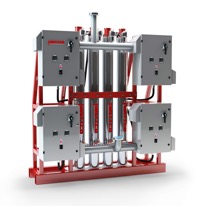Glycol Uses for Industrial Heating Systems
Last updated on April 22nd, 2025 at 05:03 am
 Industrial heating systems, like circulation heaters, generally use either water or glycol mixtures for fluids. In applications where glycol is a suitable fluid, it is almost always the superior option. This article examines the benefits of glycol and its uses in industrial heating processes.
Industrial heating systems, like circulation heaters, generally use either water or glycol mixtures for fluids. In applications where glycol is a suitable fluid, it is almost always the superior option. This article examines the benefits of glycol and its uses in industrial heating processes.
Key Benefits of Glycol
Temperature
Glycol has a greater temperature range than water. Glycol boils at 197°C versus water at 100°C, and freezes at -12.9°C versus water at 0°C.
The higher boiling point of glycol makes it more appropriate for high-temperature applications. As well, the high boiling point reduces the risk of corrosion from overheating. This keeps equipment operating longer and at greater efficiency.
The lower freezing point of glycol makes it an excellent option for freeze protection. Because the fluid can withstand colder temperatures, the heater does not need to run as often, making it more cost-efficient.
As well, in the glycol mix, even if the water begins to freeze the glycol does not. The result is a slush mix rather than solid ice. This allows the fluid to continue to flow and prevents it from expanding. As a result, the system and pipes are protected from bursting and other cold damage.
Efficiency
Even though water is cheaper than glycol, glycol’s properties make it more cost-efficient and operationally efficient to use.
Glycol has superior heat transfer. The fluid is less viscous, resulting in rapid heat transfer. This fast, easy heat transfer requires less time and energy to achieve and maintain the target temperature.
Even at high-temperatures, glycol is stable. This has a dual benefit. First, it ensures efficient heat transfer can continue at high temperatures. Second, this stability prevents the degradation of chemicals. If chemicals degrade they can corrode the system or foul the heater components, leading to costly/time-consuming repairs or replacements.
Uses in Heating Systems
 High-Temperature Applications
High-Temperature Applications
Glycol is an ideal transfer fluid for high-temperature heating applications. It achieves heat quickly and remains stable, preventing damage to the system.
Corrosion Prevention
The stability of glycol makes it the smart solution in applications with an elevated risk of corrosion. Its use can extend the lifespan and efficiency of industrial heaters.
Freeze Prevention
The low freezing point makes glycol an effective freeze prevention fluid. Freezing risks are lower, preventing damage or loss of product and equipment. As well, the low viscosity makes it quick to bring the temperature back up to target.
Heater Types That Use Glycol Transfer Fluid
Thermal Fluid Systems
Thermal fluid systems use indirect heating with heat transfer fluid, like glycol. The thermal fluid acts as an intermediary, transferring heat from the heater to the end medium target. This allows for finer temperature control and precision timing.
Circulation Heaters
Circulation heaters are commonly used in thermal fluid systems. They are highly customizable to specific applications with different materials and watt densities available. They control the flow and temperature of the fluid circulating through their system.
Water Boilers
Boiler heaters are used in a variety of industries, including comfort heating, laundry, and food & beverage. They come in low pressure and high-pressure ratings, and several different varieties.
-
Combi Boilers
-
System Boilers
-
Conventional Boilers
-
Condensing Boilers
-
Energy-Efficient Boilers
Water Bath Process Heaters
Water bath process heaters can serve several important functions, especially in the oil & gas industry. Some uses include preheating gas, hydrate prevention, heating process fluids, and temperature maintenance.
Custom Glycol Heating Systems
Wattco custom manufactures electric heating systems for all manner of industries and applications. Our heating systems are custom designed to work with your ideal fluid, be it a water or glycol mix. Our team helps to choose the right designs, materials, and heaters to fit the needs of your specific process and budget.
Contact us today for heating system quotes and information.
